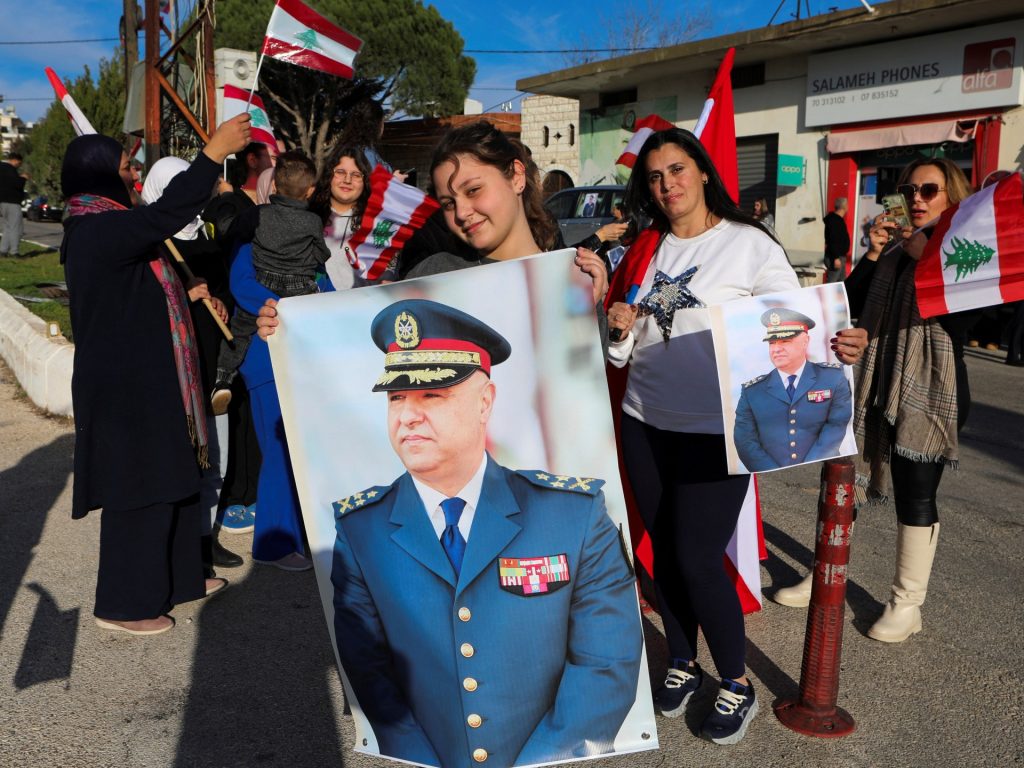The commander of the Lebanese army, Joseph Aoun, is the new president of Lebanon.
The 61-year-old will become Lebanon’s 14th president after filling a more than two-year presidential vacuum left by his predecessor Michel Aoun – who is not related to the new president.
The appointment of Joseph Aoun breaks a major impasse; The Lebanese parliament had already met twelve times to vote for a president but was unable to elect a single one.
Aoun’s support in parliament came from a wide range of political figures and he ultimately won 99 votes in the 128-seat parliament in the second round.
But who is Joseph Aoun? And why did it take so long for the Lebanese parliament to agree that he was the right person to lead the country?
Military experience
Born in 1964 in Sin el-Fil, a northern suburb of Beirut, Aoun rose to prominence during his time as commander of the Lebanese army, a position he assumed in 2017 and which, like the president of the republic, must be filled by a member of Aoun’s sect , Maronite Christianity.
Aoun’s official Lebanese Army biography states that he enrolled in the military academy in 1983, during the Lebanese Civil War.
He steadily rose through the ranks and completed various training courses in Lebanon and abroad, including with the U.S. counterterrorism program. He was also awarded the Lebanese War Medal three times, as well as several other medals and honors.
In August 2017, shortly after taking charge of the Lebanese Armed Forces (LAF), Aoun put his counterterrorism training to good use by launching an operation against ISIL (ISIS) militants who spent years in the mountainous terrain between Syria and Lebanon had – particularly in Lebanon on the outskirts of the Christian villages of Ras Baalbek and Qaa in the northeastern Bekaa Valley.
The success of the operation strengthened Aoun’s reputation. And Aoun was also able to use his years at the helm of the LAF to forge close ties with various regional and international actors, including the United States, Saudi Arabia and Qatar – a network that was particularly useful in building support around Aoun collect presidency.
Economic and political crises
Aoun’s tenure as commander of the Lebanese army coincided with a period of incredible difficulty for the country.
A years-long economic crisis has left millions of Lebanese struggling – with many army soldiers having to take second jobs to make ends meet.
The economic crisis was seen as emblematic of the broader governance crisis in Lebanon. A sectarian political system has entrenched an aging political gerontocracy associated with corruption and political mismanagement.
The horror of the Beirut explosion in August 2020, which killed more than 220 people, reinforced the feeling that the country’s rulers had completely failed the Lebanese people.
And when President Michel Aoun resigned from the presidency in October 2022, the Lebanese parliament was unable to agree on a successor despite repeated voting meetings. This resulted in the Lebanese state being effectively paralyzed just when measures were needed to address the country’s economic challenges.
The institution that Aoun led, the Lebanese army, was also widely seen as weaker than the Shiite group Hezbollah, another factor undermining the Lebanese state’s effectiveness.
To make matters worse for the country, Israel’s war on Gaza quickly moved into Lebanon when Hezbollah began a firefight with Israel on October 8, 2023, which ultimately culminated in two months of devastating Israeli bombings and a land invasion which killed more than 4,000 people and culminated in a ceasefire agreement on November 27 last year.
Opportunity
But despite the death and destruction, the resolution of the war paved the way to the final election of a president as international and domestic pressure mounted to find a solution and send the message that Lebanon would begin rebuilding.
Aoun, who was not taken seriously as a presidential candidate until 2023, was the man who took advantage of this.
He kept the Lebanese army out of the war with Israel, despite killing more than 40 Lebanese soldiers during that period, and he is also seen as a key figure in securing Lebanon’s commitment to the ceasefire that calls for Hezbollah to withdraw from it the south of the Litani River and be replaced by the Lebanese army to ensure that Israel withdraws behind the UN-designated border between Lebanon and Israel.
In particular, Israel welcomed Aoun’s appointment.
But beyond the external and domestic support for Aoun, it is difficult to define him politically, which is perhaps one of the reasons for his success in the presidential election.
Not much is known about his political views, and he rarely gave interviews – although in 2021 he criticized politicians over Lebanon’s financial crisis and said soldiers were starving.
Aoun had not expressed a clear position on Hezbollah’s arsenal, but in his inaugural speech he promised to “affirm the state’s right to monopolize the carrying of weapons.” What steps he will take to enforce this remains to be seen, and it will be difficult to imagine Hezbollah complying with a demand for disarmament.
The new president also promised to rebuild areas attacked by Israel, including the south and the Beirut suburb of Dahiyeh.
His emphasis on national unity comes at a rare moment of consensus; Aoun’s appointment ends a bitter period of parliamentary division.
But it will take much more to prove to the Lebanese people that the country has truly turned the corner and that its political leadership is capable of actually improving the lives of millions of Lebanese – a role in which they can play has failed so many for years.


